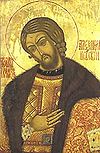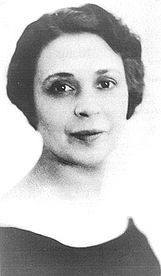- Olga Averino
-
Olga Averino (November 15, 1895 – January 17, 1989) was a Russian soprano and voice teacher. An émigré to the United States, she was prominent in the musical life of Boston for over 60 years, first as a singer and later as a distinguished voice teacher.
Contents
Biography
Olga Averino was born into a family of musicians in Moscow in 1895. Her father, Nicholas Averino, was a violist and director of the music conservatory in Rostov. Her mother, Olga Laroche, was a pianist, the daughter of the Russian musicologist Herman Laroche and the god-daughter of the composer Pyotr Ilyich Tchaikovsky. Averino, herself was the god-daughter of the composer's brother Modest Ilyich Tchaikovsky. She trained in piano and voice at the Moscow Conservatory and married the violinist Paul Fedorovsky. In 1918, the Bolshevik Revolution and ensuing civil war led the young couple to flee Russia with their baby daughter. They travelled across Siberia to Vladivostok and down into Manchuria. After living in Beijing for several years, they eventually made their way to the United States, settling in Boston in 1924 where Fedorovsky became a violinist in the Boston Symphony Orchestra; Averino appeared frequently as a soprano soloist.
She was a regular soloist with the Boston Symphony during the Koussvitzky era. Amongst the many works in which she performed there, were Beethoven's 9th Symphony, Bach's Mass in B Minor, Ravel's Sheherazade, Debussy's Martyrdom of St. Sebastian, and the American premiére of Alban Berg's Lied der Lulu. During her long career as a performer she sang in lieder, oratorio and opera and worked with many prominent 20th century composers including Ravel, Schoenberg, Stravinsky, Rachmaninoff, and Glazunov. She was a noted recitalist and is credited with having established the success of Ravel's Chansons madecasses in the United States. [1] She also toured the United States in a series of joint recitals with the cellist Gregor Piatigorsky, where her accompanist was Alexander Siloti, the last pupil of Franz Liszt.
Olga Averino taught voice at the Longy School of Music, Middlebury College, Wellesley College, and The New School of Music.[2] She also gave a lecture series at Harvard University. However, she is most closely associated with the Longy School, where she was the head of the voice department from 1938 to 1976, returning occasionally for master classes after her retirement, the last of which she gave in 1987. It was also at the Longy School that she gave her final public recital, at age 74. Amongst her many pupils, perhaps the most prominent is the American soprano, Phyllis Curtin, who studied voice with Averino at Wellesley College during the 1940s. Curtin said of her teacher:
- "Impatient of sloppy musicianship, demanding emotional commitment, she gave me a vision of the art of singing that led me the rest of my life. On the few occasions when she sang, I learned what a great singing artist is." [3]
Her charismatic teaching style was also recalled by composer and critic, Greg Sandow, who studied under her at the Longy School:
- "[She] would bring her students all together for a class. Somebody would sing, and, in her Russian accent, Olga typically would ask, 'What emotion does the person in the song feel?' 'The person in the song is angry,' the student would reply. 'But which kind of anger?' Olga would demand, and then sing the opening of the song six times, in six precisely differentiated shades of anger, as distinct as six different people." [4]
Olga Averino and Paul Fedorovsky's daughter Irina Lasoff (1918 – 2006) became a noted choreographer and teacher.[5] Following her husband's death in 1958, Averino moved from their home in Boston's Back Bay to an apartment in Cambridge where she continued to teach private pupils until a few days before her death. Olga Averino died in her sleep in Cambridge, Massachusetts at the age of 93.
Recordings
- South American Chamber Music (Soprano Olga Averino, Violinist Alfredo St Malo, Cellist Fritz Magg, Pianist-Arranger Nicolas Slonimsky) Columbia Records, 1941.
- French Songs (Soprano Olga Averino), Victor records, 1940.
Book
Olga Averino, Principles and Art of Singing, Novis, 1989 ISBN 8789389018
Averino wrote Principles and Art of Singing in the late 1970s and continued to revise it through 1987, circulating mimeographed copies amongst her students and friends. The book, edited by her daughter, Irina Lasoff, was finally published posthumously in late 1989.[6] The final words of the book are a summation of her teaching philosophy:
- "Singing is an expression of life, and if you have no time for your life, how can you sing? Quality always needs time, not only in music but also in life itself." [7]
References
- ^ Obituary: Olga Averino, Boston Globe, January 20, 1989. Accessed via subscription 24 January 2008.
- ^ The New School of Music in Cambridge, Massachusetts was founded in 1976 by pianist and composer Nicholas Van Slyck.
- ^ Ira Siff, What's the Greatest Voice You Ever Heard?, Opera News, September 1999. Accessed 24 January 2008.
- ^ Greg Sandow, View from the East: Learning from Proust, New Music Box, April 1, 2004. Accessed 24 January 2008.
- ^ Ben Cohen, Obituary: Irina Lasoff, Minneapolis Star-Tribune, May 9, 2006. Accessed via subscription 24 January 2008.
- ^ Richard Dyer, Notes, Boston Globe, June 30, 1990. Accessed via subscription 24 January 2008.
- ^ Review of Olga Averino's Principles and Art of Singing by Johanna Peters, reprinted from Opera, December 1991, p. 1447.
Further Sources
- Richard Dyer, Averino Opened Doors in the World of Music, Boston Globe, January 21, 1989. Accessed via subscription 24 January 2008.
- Robert Wilder Blue, American Icon: Phyllis Curtin, USOperaWeb, Autumn 2002. Accessed 24 January 2008.
- Obituary: Olga Averino, New York Times, January 21, 1989. Accessed 24 January 2008.
External links
- Portrait sculpture of Olga Averino by Anna Coleman Ladd, Smithsonian American Art Museum, Photograph Archives, Washington D.C.
People from Russia Leaders and religious - Pre-1168
- 1168–1917
- 1922–1991
- 1991–present
- RSFSR leaders
- General secretaries
- Soviet premiers (1st deputies)
- Soviet heads of state (and their spouses)
- Prime ministers (1st deputies)
- Foreign ministers
- Prosecutors general
- Metropolitans and patriarchs
- Saints

Military and explorers - Field marshals
- Soviet marshals
- Admirals
- Aviators
- Cosmonauts
Scientists and inventors - Aerospace engineers
- Astronomers and astrophysicists
- Biologists
- Chemists
- Earth scientists
- Electrical engineers
- IT developers
- Linguists and philologists
- Mathematicians
- Naval engineers
- Physicians and psychologists
- Physicists
- Weaponry makers
Artists and writers Sportspeople Chess playersCategories:- 1895 births
- 1989 deaths
- Operatic sopranos
- Russian female singers
- Russian opera singers
- Voice teachers
Wikimedia Foundation. 2010.

